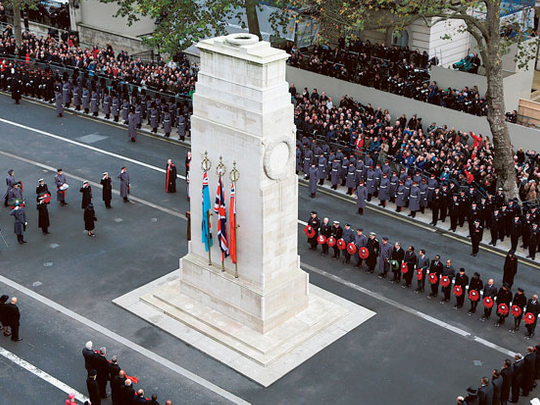
LONDON: Queen Elizabeth was to lead Britain in paying silent tribute to the Commonwealth war dead on Remembrance Sunday, a century on from the start of First World War.
The 88-year-old monarch was to lay a wreath at the Cenotaph national war memorial in London, accompanied by senior members of the royal family and prime ministers past and present.
The centrepiece of a series of events marking the centenary of the outbreak of First World War, the ceremony’s most solemn moment will be a two-minute silence from 1100 GMT.
The silence will start and end with a round from a 13-pounder First World War gun.
Britain declared war on Germany on August 4, 1914 and more than a million people from what was the British Empire died in the four-year conflict. The Cenotaph was erected in 1920 to remember the fallen.
Prime Minister David Cameron said this year’s Remembrance Sunday was “particularly poignant” as 2014 marked the centenary of the start of First World War, the 70th anniversary of the Normandy landings and the end of Britain’s combat role in Afghanistan.
“Today we stand united to remember the courageous men and women who have served our country, defended our freedoms and kept us safe,” he said.
“We remember all those who have fallen and those who have risked their lives to protect us.
“We owe each and every member of our armed forces and the families who support them a tremendous debt — one that can never be repaid — and I pay huge tribute to their bravery and resolve.”
Queen Elizabeth was to be joined by her husband Prince Philip, 93, who was a naval officer in Second World War, and their eldest son Prince Charles, the heir to the throne.
In a sign of dramatically improved relations between the Republic of Ireland and Britain in recent years, Dublin’s ambassador to London will lay a wreath at the Cenotaph for the first time, to honour the thousands of Irishmen who fought and died in British uniform in First and Second World Wars.
Meanwhile, Cameron has launched plans for a ₤1 million national memorial in tribute to the troops who fought this century in Iraq and Afghanistan.
It will mark the service of more than 220,000 service personnel who have fought in the two campaigns since December 2001 and the 632 troops who lost their lives in the conflicts.
Cameron wants the memorial to be opened in 2016, a decade after British troops first entered Afghanistan’s troubled southern Helmand province.
Queen Elizabeth and members of her family were at the Royal Albert Hall in London on Saturday night for the annual Festival of Remembrance.
They joined veterans and members of the public in paying tribute to the nation’s fallen.
When bereaved family members walked onto the hall’s stage during the event, which features music, drama and readings, they received a standing ovation. Charles’ wife Camilla was among those seen wiping their eyes in the Royal Box.
Former troops gather for the festival, during which scarlet poppy petals fall from the dome to represent all those who have died in combat.
In the run-up to Remembrance Sunday, many Britons wear a paper red poppy — symbolising the poppies which grew on French and Belgian battlefields during World War I — in their lapels.
The proceeds from poppy sales go to the Royal British Legion veterans’ organisation.
The Tower of London’s moat has been filled with 888,246 ceramic poppies, one for every British soldier who died in the conflict.
The art exhibit, called “Blood Swept Lands And Seas Of Red”, has captured the public imagination and huge crowds have lined the walls, sometimes more than 10 deep, for a glimpse of the poppies.
The display was due to be dismantled from Wednesday but one section will now remain on show until the end of November to allow more visitors to see it.











